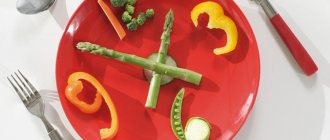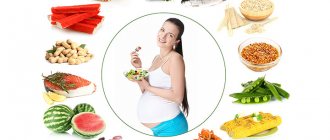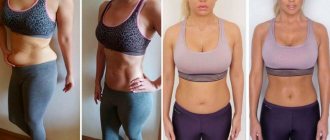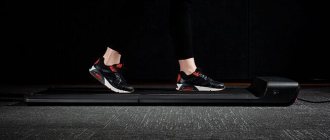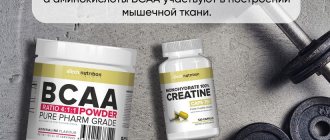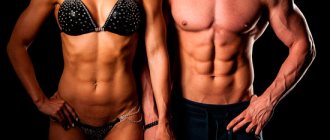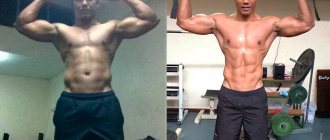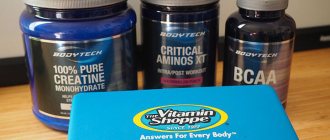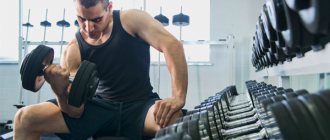Muscle mass is built not in the gym, but in the kitchen and while sleeping. Proper nutrition is a guarantee that all your work will bring results in the form of beautiful muscles. Find out how to eat healthy when you lift!
Beginners want to know how to get pumped, but experienced athletes usually dig deeper and are interested in how to eat properly when lifting in the gym. Indeed, they are right: to build the body of your dreams, you need to supply your body with high-quality fuel to work effectively.
Transforming your body means giving it your all in every workout. And in order for you to have the strength to give your best, it is important to eat right. Find out more about useful and essential macro- and microelements in this article.
Macronutrients are what the diet consists of. These include carbohydrates, proteins and fats. Microelements mean vitamins and minerals that are essential for health and beauty. Microelements are found in everything you eat, and fresh vegetables, fruits and whole grains are especially rich in them.
We will tell you in more detail about the most important elements for an athlete.
Eat carbs when you lift.
Even though carbohydrates get a bad rap in modern society, they are actually the most acceptable source of energy. By eating the right carbs, you'll build tons of muscle without excess fat.
Focus on two types of carbohydrates:
- Complex starchy carbohydrates such as sweet potatoes, brown rice, oatmeal, and whole grain bread
- Complex fibrous carbohydrates, such as broccoli, spinach and other vegetables
Fruits are not only tasty, but also healthy. They contain many vitamins and minerals essential for health. However, they are high in sugar and calories. Considering your goal is to gain muscle mass, you should consume them in moderation. Give preference to fresh fruit, not smoothies or canned goods.
Additional Tips
Properly organizing nutrition, which, together with training, will contribute to muscle gain, is quite difficult.
Firstly, when compiling a diet, you will have to deal with many indicators: calculate the daily calorie content, find the correct proportion of dietary fat, distribute all this among meals, prescribe a clear daily routine by the hour.
Secondly, you need to take into account the characteristics of your body. If an experienced bodybuilder who has been going to the gym for more than 3 years and taking sports supplements is gaining weight, he will need the same amount of proteins, carbohydrates and daily calories. If a beginner in sports dreams of relief, for him all these indicators will be completely different.
Downloading ready-made programs from the Internet and trying them on yourself is not a very good solution. Such materials are copied without regard to who exactly they are designed for - men or women, beginners or professionals, simply for gaining weight or cutting, ectomorph or mesomorph. All these nuances are of great importance.
Nutrition programs for building muscle mass should be selected taking into account the type of human body structure
Therefore, it is strongly recommended that if you have any doubts or lack of experience in such matters, you seek help from professionals. This could be a sports nutritionist or a trainer trained in a special program.
What general recommendations can be given to those who are planning to build muscle:
- Creating a calorie surplus: more calories must enter the body than are expended.
- High daily calorie intake.
- Mandatory snacks before and after training to close carbohydrate-protein windows.
- It is advisable to include sports nutrition in your diet.
- You can't go to bed on an empty stomach.
- Without enough water, muscle building will be inhibited. Therefore, the daily norm is at least 1.5 liters, and on training days - 2 liters.
Do not forget also that two components are equally important for gaining muscle mass - nutrition and exercise. Therefore, you need to take care of the following points:
- a competent, clearly drawn up training program that should be unconditionally adhered to;
- careful alternation of cardio and strength exercises with a predominance of the latter - on the advice of trainers, some should exclude the former altogether;
- interval training is encouraged;
- do not forget to give your muscles rest to recover (go to the gym every other day).
So to gain weight you should use all the possibilities in combination.
Protein nutrition will help build muscle
When you are lifting, proper nutrition requires the presence of proteins in the diet.
They are responsible for the restoration and growth of muscle tissue. You should get at least 1 gram of protein per kilogram of weight. Excellent sources of quality protein include chicken, lean turkey, egg whites, whole eggs, soy products, tilapia and other white meat fish.
As a supplement, you can take protein supplements - protein shakes and bars. They are convenient and you can always snack on them when you can’t have a full lunch. However, remember: supplements are only an addition to a diet rich in whole, unprocessed foods.
What to eat after training: athlete's menu
All recommendations should be divided into two categories according to their objectives:
- to burn excess weight;
- for gaining weight and working on a sculpted body.
But there are common tips for any type of activity:
- Maintain a balance of nutrients. 50-60% are carbohydrates. With their help, you will fill the carbohydrate window that you created during exercise. Proteins should be up to 30%. These are the building blocks from which muscles are built. But this will not happen without the influence of fats, so the remaining 10-15% comes from lipids.
- Be careful about the quality of the products. Avoid fast food and processed foods. The best food is primary processed. Pasta and baked goods made only from durum wheat, possibly with the addition of bran; vegetables and fruits – fresh; meat and fish - not in the form of purchased minced meat, but in large pieces.
- Regardless of the purpose and method of exercise, after exerting force on the machines, take two meals. The first is a snack. It should consist of quickly digestible proteins and carbohydrates. This could be a candy bar or a glass of a protein shake. You need to drink it within half an hour. A full meal is after an hour and a half.
What can you eat after strength training for muscle growth?
In the first 30 minutes, it is necessary to close the anabolic window. Fast carbohydrates with a high glycemic index will help do this. Perhaps this is the only time when it is useful to use them. This way you will raise the level of insulin in the blood and prevent catabolic processes - the destruction of muscle mass.
You can eat:
- buckwheat, oatmeal, pearl barley, semolina or other porridge;
- rice;
- pasta from durum wheat;
- bran bread;
- as a complement to cereals - honey, butter, nuts, bananas and other high-carbohydrate fruits;
- freshly squeezed juice (watermelon and pomegranate will also help relieve muscle pain);
- cottage cheese and any other dairy products;
- poultry, pork, beef;
- fish;
- chicken or quail eggs.
What is the best thing to eat after a cardio workout?
If you want to lose weight, then you need to achieve a calorie deficit. Ideally, you should not eat for another 2-3 hours. But after jogging, be sure to drink a glass of clean water, this will temporarily suppress the feeling of hunger and allow the body to use fat reserves for energy. Metabolic processes will continue to rid the blood of released lipids for a long period.
When enough time has passed, you can eat:
- eggs or protein-rich lean meat;
- dried fruits – fresh fruits are best consumed before exercise;
- whole wheat bread;
- seafood, especially squid;
- low-fat yoghurts and cottage cheese;
- boiled or stewed vegetables.
You should exclude fast carbohydrates in the form of chocolates and bars and increase your fluid intake.
Fresh water and unsweetened green tea will do. Outdoor training requires more energy, so in winter athletes need to eat more and choose warm equipment. offers down jackets and overalls made from modern synthetic fabrics and innovative fillers that last a long time and do not wear out.
Proper and healthy fats for pumping up muscles
Not all fats are created equal, and to achieve a beautiful, muscular body, it is important to consume only healthy fats and fatty acids, such as Omega 3, which is found in fish and flax seeds, as well as fats from olive oil and avocado. They play an important role in hormone production, skin color and brain function. Fats keep energy levels constant and provide the body with essential nutrients.
The main rule is moderation, since fats are high in calories.
Include natural peanut, olive or almond oil, and avocado in your diet as sources of fat. In addition, fats will come from eggs, meat and fish.
Recently, dietary supplements containing Omega-3 essential fatty acids, namely fish oil and flaxseed oil capsules, have become increasingly popular. They help maintain healthy levels of essential fatty acids in the body.
If you enjoy foods like fish, seeds, nuts and avocados, you won't be short of healthy fats from whole foods. Although supplements containing EFAs and Omega-3s will be a great addition to your diet.
And a few words about “bad” fats. If there are good fats, what are the “bad” ones? Eating such fats in large quantities can cause health problems.
Avoid foods high in saturated fat, found in animal products and some vegetable oils (coconut and palm). Choose low-fat or skim dairy products and trim excess visible fat from meat.
Chemically produced trans fats and hydrogenated oils are used to extend the shelf life of processed foods such as candy, margarine, packaged and convenience foods. Such foods are not at all consistent with proper training nutrition, so try to completely eliminate trans fats from your diet.
Why you shouldn't fast before training
Any physical activity requires enough energy to have the strength to achieve your goals. This energy will not come from nowhere, so eating food is not only advisable, but extremely necessary. Working out on an empty stomach, an athlete may simply not have enough strength, especially in intense training, which requires great mobility and high impact. Such fasted training can lead to loss of coordination, changes in breathing, inability to concentrate on a task, and even loss of consciousness.
Training without a long meal will be less effective, since a person will quickly feel tired, and the stomach will begin to give signals that it is already hungry, diverting the athlete’s attention from the task of training. You can only not eat before 10-minute morning exercises, since its task is only to awaken all body systems after sleep and prepare it for the working day.
How to eat as a vegetarian while building muscle
Many people don’t know how to eat properly when lifting, and this dilemma especially applies to vegetarians. Even if you don't eat meat or animal products, you can still transform your body and build muscle. Use your imagination, as every meal should provide the body with high-quality proteins.
If you consume dairy products, then increase the amount of protein in your diet through low-fat cottage cheese and yogurt.
In addition, soy products are suitable for vegetarians. They are an excellent source of protein and are available in almost every supermarket. You can also try meat analogues that are made from plant proteins: soy, mushrooms, etc. These products look and smell like real meat. It comes in the form of chicken cutlets, hamburgers and even tacos.
These substitutes will add flavor and variety to your diet, but always read labels to make sure there is no sodium, corn syrup, or saturated fats or hydrogenated oils in the ingredient list.
Many vegetarian and vegan diets include nutritious combinations such as beans and brown rice, natural nut butters, and bread. The main thing is to follow the basic principles of proper nutrition for building muscle mass: eat 5-6 times a day in small portions, choose whole foods and create a small surplus of calories for bulking.
No. 1 Increasing calorie intake
If you consume 100-200 more calories per day than usual, you will not be able to quickly increase muscle size. As the caloric content of the diet increases, the metabolic rate also increases, which means that a small amount of “extra” calories will simply be burned without turning into muscle mass. As a result, muscles will grow almost imperceptibly for you. Well, if there is no visible progress for a long time, the motivation to give all your best in training gradually disappears.
In order to quickly increase muscle size, you need to consume 10-20% more calories than usual. For people of asthenic physique, 2000 kilocalories per day is too little. Such a diet will not lead to muscle growth, but to weight loss, since the body will simply get rid of muscle fibers due to lack of energy. Of course, in each case the calorie surplus is calculated separately. However, as a rule, this figure is about 500 kilocalories.
It is important to remember that it is impossible to gain weight only due to muscles: the amount of fat in the body will also increase. To limit the gain of fatty tissue, eat as few fast carbohydrates as possible. Also, try to get in some cardio a few times a week.
How much should you drink when lifting?
What should you drink while on a diet? Water, lots of water. Without adequate hydration, muscle growth is stunted and health and performance can suffer. It is ideal to drink 4 liters of water per day.
Just because you're on a high-calorie diet doesn't mean you can drink milkshakes, sugary juices, or whole chocolate milk in any quantity. The main factor here is moderation. Read food labels and try to stay within your daily calorie allowance.
What portions should you eat to build muscle?
Portion sizes go hand in hand with calories. Don't think that measuring portions is difficult. There is a little trick that makes life easier for many bodybuilders. Each meal should consist of:
- palm-sized portions of protein
- servings of complex carbohydrates the size of two palms
Add some healthy fats 2-3 times a day. This could be 1 teaspoon of flax or olive oil in a dish, or as a snack, spread a piece of bread with natural peanut or almond butter.
Eat 1-2 servings of fruits a day, and don't forget that vegetables can be consumed in large quantities. They don't have much of an impact on your diet, but they are a source of vital vitamins, minerals and fiber!
Food for muscle growth
Now we have come to the most interesting part of the article, from which you can understand what you should still consume in order for your muscles to grow and you not to become fat.
Let's look at the tables. They show foods from which you can get the required amount of proteins, fats and carbohydrates per day (this does not mean that you need to eat all these foods in a day)
| Squirrels | |||
| Beef | Tuna | Turkey | Chicken |
| Eggs | Fish | Cottage cheese |
| Carbohydrates | |||
| Pasta | Buckwheat | Oatmeal | Asparagus |
| Corn | Apples | Zucchini | Tomatoes |
*Consume any vegetables. Make salads out of them and season with olive oil
Also, don’t forget about the supplements that everyone should take. You can read about them by clicking on the link. Basically, these are supplements from a sports nutrition store; whether you use it or not is your choice. We highly recommend using vitamin and mineral complexes, fish oil and calcium in your diet; everything else is at your discretion.
By going to this address: you will learn about one of the best diets for cutting. And here, you will learn about how to pump up your buttocks at home.
What foods should you avoid when building muscles?
When you lift, you should eat in a special way. Avoid refined, “white” carbohydrates such as white bread, white rice, cakes, cookies and candy. They have too many calories and almost no nutrients.
Avoid packaged and processed fast food or ready-to-eat foods, which are loaded with preservatives and bad fats that will ruin your fitness goals. Try not to drink carbonated soda water and fruit juices containing sugar!
Alcohol is allowed only in small doses, and it is better to avoid it altogether. Alcoholic drinks contain empty calories, usually from sugars. But not all types of alcohol contain the same amount of calories and sugar. For example, if you are trying to gain muscle mass, mixed drinks with added sweet juices or cream are not suitable for you.
Choose red wine or cocktails with soda and lime. A few drinks on a special occasion are fine, but try to alternate them with plain water.
No. 7 Eating before bedtime
At night, muscles grow and repair. The protein that was consumed during the day is broken down into amino acids at this time and used to build new muscle fibers. Therefore, the protein you eat before you go to bed will protect you from catabolism, that is, the breakdown of muscle mass, during the eight-hour rest period.
At night, it is advisable to eat proteins that are absorbed quite slowly. This could be cottage cheese or casein protein.
If you have certain difficulties with gaining muscle mass, then you can drink a protein shake at night when you wake up. True, it is important to wake up not by an alarm clock, but on your own: just drink a glass of water before going to bed.
Eating in restaurants and pumping up muscles
It's hard to stick to rules when you're meeting friends at a restaurant or forgetting food at home. You realize that it's time to eat, but there are no healthy foods nearby.
- If you find yourself without food and decide to have a meal at a restaurant, just choose the right dishes.
- Order a grilled chicken sandwich without mayonnaise, grilled chicken breasts, steamed vegetables or a baked potato.
- Avoid fried foods, processed or “white” carbohydrates, and creamy or cheese sauces.
- Please order salad dressing separately.
- Instead of soda, give preference to plain water, and a slice of lemon will give it a pleasant aroma and taste.
Try another trick: split the meal with friends or ask them to pack half of it to take home. Thanks to these simple nutritional rules, you will enjoy your food and not destroy everything that you have achieved so hard by pumping up your muscles in the gym.
